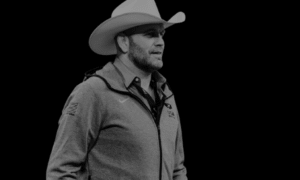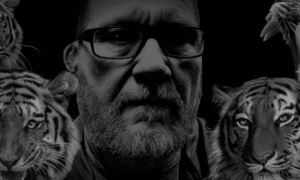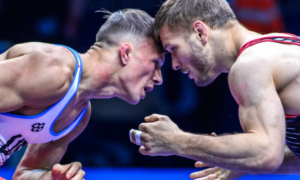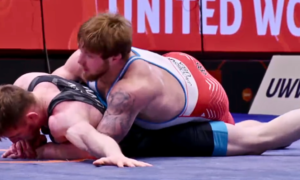Five Point Move is proud to host US Greco Roman National Team Head Coach Matt Lindland every week for “Coach Lindland’s Report.” For fans and wrestlers looking for insights regarding the US Greco National Team, we ask Coach Lindland some questions to get his take on training and upcoming competitions. If you have any questions you’d like us to ask going forward let us know via Facebook, Twitter, or through our Contact page.
This week, Coach Lindland is back from the 2nd OG World Qualifier in Istanbul, Turkey, which saw Jesse Thielke (NYAC, 59 kg) electrify the fanbase with his dominant run through his side of the bracket and secure qualification for the Olympics. It also marked the end of this cycle’s Olympic journey for two other US Greco stars, RaVaughn Perkins (NYAC, 66 kg) and Joe Rau (Minnesota Storm, 98 kg). We talk about that, the big news coming down from UWW with the World Championships for the non-Olympic weights, and how the Junior camp in Colorado Springs is coming along. Also – Coach Lindland doesn’t know it’s baseball season.
5PM: Was there anything surprising to you at all about Thielke’s performance?
Coach Matt Lindland: Nothing at all surprising. I saw Jesse compete when he was on the World Team in 2013 and I thought he was one of the best Greco Roman wrestlers in the US I’ve seen, and I’ve been on some teams with some pretty incredible guys like Garrett Lowney, Dennis Hall, Brandon Paulson, and Rulon Gardner. I’ve been on some really good teams with a lot of really good Greco guys. And I just feel that Jesse’s a very instinctual wrestler, he feels things and he just reacts like he did in that match against the Swede, Farunze (Harutyunyan). That was incredible. He was getting beat, you know? He needed to react and he did and he put that guy on his back and pinned him. Jesse was coming off of a couple really dominant matches. Against Modos, he just came out and lit that kid up 8-0 and boom, it was over. Then they tried to give him eight points against the Georgian who was a silver medalist at the Olympic Games. And they tried to give him eight points, then they threw the cube and I looked at them and was like, “Yeah, that was a good idea to throw that cube.” (Laughs) I don’t know if that was eight. But it turned out it was six points and he came back and finished that match off. A couple of really tough guys. Farunze had just got done beating Ivo (Angelov) from Bulgaria in the first round, who was a World Champion and now that guy’s not going to the Olympics.
But yeah, I definitely know Jesse’s capable and I think getting these extra matches in Mongolia and then coming here and wrestling five matches and just building that confidence that he needs. Now he maybe knows how good he is. Because I already knew how good he was. But now I think Jesse’s got a better idea of where he stands in the landscape of this weight class in the world. You know, traditionally the lower weights aren’t the toughest weights, but when you start combining two weights into one, it becomes one of the toughest weight classes in the world. You take 55 kg and 60 and put all those incredibly athletic ninjas in those weight classes. These guys are quick, they’re lightening fast, they’re these little ninjas but at the bottom of the weight. Wrestling is a bell curve. Your best guys are going to be in the middle, but the middle is just getting bigger. The ends are gone. They’ve taken so many weight classes away from our sport now and combined them. Now this weight class has just become incredibly deep, and so for Jesse to realize how good he is and to beat World and Olympic medalists along the way is just going to improve his confidence going into the Olympics and give him a little more experience, as well. So yeah, I was not surprised with the way Jesse performed.
5PM: What was your reaction towards the end of the first period against Islamov when Thielke got ahead 9-8 after being down at one point 8-3?
ML: I remember EXACTLY what I said to him (laughs). It was very profound. We knew he (Islamov) had a great arm throw. “Watch the arm throw.” You know, he gets arm-thrown and he looked over at me like, “Oh, yeah.” And then he got hit again with an arm throw? And then he still comes off the first period winning 9-8. I looked at him in the eyes, because I remembered a couple weeks earlier we were in Mongolia and he let his foot off the gas, so I said, “Wrestle like you’re two points behind for the rest of this match.” I just looked him right in the eyes and was like, that’s the plan. He just nodded up at me, “YES. I got it.” (Laughs)
And he was wrestling free, he was wrestling open. You know, if our guys would have competed like that at the Pan Am Qualifiers in Texas, I’m confident we could have qualified all of our weights there and we wouldn’t have had to do this world tour. But like I said, the experience is going to benefit Jesse in the long run and hopefully this year in the Olympic Games.

5PM: Getting back to RaVaughn and Joe, RaVaughn had a really impressive tournament in Mongolia and he seemed like he was picking up right where he left off and then he ran into Tsarev, who’s a pretty tough guy. But either way, you’ve got to feel really good about Perkins going forward, right?
ML: Yeah, I’m really excited about Perkins. I know for a fact him being here in Colorado, being involved in this sport completely changed his life and created new opportunities for him he wouldn’t have in Omaha. So this is where he needs to be, this is what he needs to be doing at this time in his life. We took him with us in 2014 when we did our training camp in Shymkent, Kazakhstan and he worked out with Ruslan.I didn’t see any problems with it (Perkins’s performance). The guy (Tsarev) just had a great match. He was on fire that day. He had some good matches that day and RaVaughn wrestled well. He just didn’t beat him.That was the match that kept him from getting the weight qualified, so that was unfortunate.
But RaVaughn is doing phenomenal things. He got really quiet after he lost and didn’t talk much for the next day or so, but we saw his comments on his Facebook. He’s not done, he’s motivated, he’s encouraged, and he’ll be back. He’s been out here helping me with the Junior camp this week, been in the room mentoring these Juniors and Cadets. I mean him Jesse, Rau, Cheney Haight, Corey Hope, all these Senior athletes that are around here are giving back to these younger athletes. That’s what this sport is all about, this sport is about creating quality men. I’ve got a really great group of men that I have the opportunity to coach. I’m just blessed to have all these guys on my team and to see them giving back to all these athletes just encourages me because these young guys are so good, they just want to be recognized, as well. Our Senior athletes are in there helping them and working with them, so they’re very grateful.
And I think that’s what it’s going to take to encourage these young guys to take that step and take that leap of faith that, Hey, I want to be a Greco wrestler and I know what it takes to compete at the World level. Right now, I’ve got four of my World Team members on the Junior team here, I’ve got a few of the guys who are potentially going to be on our Cadet team also and I’ll let you know in a couple of weeks when we’re down in Akron. We should have some good age-group teams this summer. They’re really talented guys who are working hard and getting better and they’re all in here sharpening their skills against one another.
I have a great opportunity because I had a camp scheduled during this period of time that we weren’t going to be here for. Because our guys were overseas qualifying the weights. The USOC was gracious enough to allow me to convert that from a Senior camp to a developmental camp even though it’s an Olympic year and during Olympic years they’re really focusing their resources just entirely on the Seniors and getting the team ready. But it’s really hard for me to ignore my Juniors and my Cadets. I mean, that’s our pipeline. So just because it’s an Olympic year you can’t leave your developmental athletes out in the waves. You’ve got to bring them in, you’ve got to coach them up, you’ve got to get them training together, you’ve got to get them training with the Seniors. I’ve seen that work with our guys and I don’t know if that’s happened much in the past. It didn’t when I was a Senior athlete, I can tell you that. I never trained with Juniors or Cadets. But maybe there weren’t enough Cadets or Juniors who were even good enough to train in our room. No, I’m not talking about every Cadet or every Junior, I’m talking about guys that are making our World Team who are good enough. Shoot, they are on our National Team, they are Seniors. Guys like Tracy Hancock, those are the kind of guys I’m talking about. Guys who are winning the World Team Trials at the Junior level but they’re also making our National Team at the Senior level. That’s our pipeline. It’s not someday or in the future, it’s now for these guys. And they’re capable and going to be right on the heels of all the guys who are Seniors right now.
5PM: Getting back to Rau, he looked composed and dominant against Setaghyan from Spain in the first bout. His second match was against a guy he beat in March and it just seemed like he got caught in quicksand, caught in a bad position and there were just two ways that was going to go from there.
ML: Arm drag to a trap-arm, I mean, trap-arms end matches and that’s what happened. He got caught in a trapped-arm and that was it. You know, Joe, maybe he’s better off at 85. Maybe he just doesn’t have enough mat time or experience yet. If it was heart, he would have qualified, I can tell you that. And desire? Joe works hard, trains hard, he goes out there and competes very well. I said it before, I think he’s one of our most composed competitors. And that is something that’s developed over time. So I think he’s really got the mental skill-set and the mental side as well as any of our guys. But I think it’s a technical position, just time in Greco Roman. You know, he spent five years wrestling folkstyle. And I know he was on the World Team two years ago at 80 kilos and like I said, that’s heart, that’s fight. Joe’s a great fighter, has a ton of heart.
But I think he still needs to develop skills. He came straight from the Turkey qualifier back to here in Colorado. I mean, he’s not training super-hard but he’s in the room building skills and studying film and he’s working out. But he’s in there going, “What are you teaching these Juniors, Coach? Because I want to be in there while you’re teaching it.” So he’s got the right attitude. Absolutely. He wants to get better, he wants to learn, he wants to improve. And he’s willing to do whatever it’s going to take to get him to that level. I loved having Joe on our team. He’s going to improve. With that attitude and that work ethic, there’s no question he’s going to make the adjustments technically and he already has the right approach.
5PM: Plus in the context of the sport in this country, he’s become a face, a fan-favorite who people root for.
ML: Yeah, I think he might be the “Rudy”, the underdog. You know, he’s a kid who came from a DIII school, he’s not one of the big NCAA Division I stars. He wasn’t a Junior or Cadet World Team member or world medalist at that level. He’s a hard-working, blue-collar kid. I think that’s what people appreciate about him, like about him. He’s honest, he’s got a good personality, he has a great sense of humor and he’s a likeable guy. He’s your “average Joe.” We call him “Sloppy Joe” because if you ever sat with him at dinner… (Laughs) But he’s kind of your “average Joe” who everyone wants to root for because I think they see a little bit of themselves in him, you know what I mean?
5PM: Okay, so you’re still in Springs but you’re soon going to Concord, is that right?
Coach Matt Lindland: Yeah, next week we’re going to have a camp out in Concord. The Senior athletes will be training in the morning. We’ve got a good plan to work on some technical skills. Everybody’s got little individual areas they want to improve on and just refine and sharpen before the Games. We’re talking to each one of our athletes individually about what that area is they want to work on and improve on. And then in the afternoons they are going to get to go back and coach a lot of our Juniors. We also have our Concord Cup, which used to be a premier Senior event, but there are a lot of premier Senior events all over the world and so we felt like, or actually, Bill Martell and Marc Halvorson, the guys who run and founded the Concord Cup, felt that we needed to get our Junior athletes some international matches. We’ll have Hungary, Sweden, and then a Nordic team which is a combination of Sweden and Hungary. Norway doesn’t have enough of a population to fill an entire team or maybe they don’t have the budget. So they picked a few of the Swedes who didn’t make the first Swedish team. We’ll have three international teams there as well as teams from across the country. Some of our top Juniors are going out there to wrestle. Tracy is going out there, Dalton, D’Armound. They are all currently on our World Team, plus we’ll have some of our other Juniors from across the country get out there and compete, and then they’ll stick around for a week to train under the Olympic Team. Our Olympic Team members are going to be the guys who coach these Juniors this week and they’re going to be at that camp. And then I will be working with our Senior Olympic Team in the mornings.
It’ll be great. Not too intense. We’re going to be out in the Bay Area. We’ll get to do some stuff like go to the UFC Gym, probably head into San Francisco and spend the day there. Hey, are there any ball games going on or is that season over? I don’t know, I’ve been to that park before though.
5PM: It’s baseball season, indeed it is, come on.
ML: Is it? I don’t know, shoot. (Laughs) I’m so deep in wrestling season.
5PM: So you got back Sunday night and hit the ground running on Monday back to this camp?
ML: Yep, Monday morning. I was excited to get in there and work with our Juniors. They got to work with Spenser Mango, Chris Saba, who is our Olympic coach, Herb House was here, TC Dantzler.. They were in good hands for the two days I was gone and they ended up running the incline on Saturday. But yeah, they were in great hands and I was excited to get back in there and get a chance to work with them. Monday and Tuesday next week I am going to take a couple of days off, my daughter is coming in to visit me and I’m going to spend the weekend with her. I’m going to take Saturday and Sunday off and then maybe even Monday and Tuesday, we’ll see. And then we’ll travel on Wednesday.
5PM: And finally, word came down today that there will be World Championships for the non-Olympic weights in December held in Hungary. This seems like it’s pretty big news.
ML: I think it’s really exciting news. Good thing I’m staying up on my wrestling news, not my baseball news (laughs). I looked at it and I’m telling you, within ten minutes of me seeing that posted I had guys texting and calling me going, “When are the Trials?” Dude, you saw it the same time I did! (Laughs) It was crazy. But I know there are some guys who were very excited about having a second chance, you know? How many times do you get a chance where you don’t make a team and in the same year you get the opportunity to make another team? I know not everybody is going to get that opportunity. There are some bigger guys and there are some smaller guys and our non-Olympic weight classes are right in the middle of 71 and 80 kilos. So I know there are going to be some guys moving up, moving down, making that weight. We saw some guys making adjustments to get into the six Olympic weights. I think we’re going to see quite a few guys moving up or down to try and get the opportunity to win a World Championship.
5PM: I imagine it must be rejuvenating for wrestlers who have had to adjust their weights for an Olympic year but still didn’t make the team. This must be like getting a new life.
Coach Matt Lindland: Especially a guy like Pat Smith, who isn’t a 66 kilo guy. At all. And unfortunately, he is kind of that in-between. He’s a legitimate 71. I don’t know if he’s big enough for 75. But even guys like Brian Graham, RaVaughn will go up to 71. Saddoris, who’s a monster at 66 will go up to 71. I mean, that’s a great weight for them. That’s the weight for Saddoris we encourage him to compete at during the winter so he’s not cutting for months on end. He’s still training and getting an opportunity to compete again. But we’ll see a lot of guys at those two weight classes. And we might see some of our guys who are big at 85 kilos go, “I gotta get my weight down.” But certainly it’s going to encourage these guys that didn’t make a team this year to continue training and prepare for a World Championship, so it’s a positive thing for our program.
5PM: I wonder what it’s going to do for stuff like the Farrell.
ML: Well, there might be exciting news for the Farrell, we’re going to have to host our Trials somewhere, so…
5PM: You’re coming up on two full years as the head of the US Greco program. Where does Thielke’s performance rank for you in terms of highlights you’ve witnessed?
ML: I think it’s been my biggest highlight so far. Winning the Pan Am Games since 1975, the last time we did that, that was a huge highlight. And having Jon Anderson beat the Junior World Champion from Cuba, Alan Vera. Vera was just like, “Stop, STOP coming after me!” (Laughs) He just put his head down and his hands out straight like, “Stop, don’t come at me anymore!” That was pretty fun to watch that and to see the team get that victory there. Andy’s performances both years at the Worlds. Even in ‘14 with Spenser’s performance at the Worlds for fifth place and Robby’s performance last year for fifth place.
I mean, we’re making progress. We’re moving in the right direction. And I think everybody would like to see it faster. I know the fans would. For sure. And I can feel that. I know people in my organization would love to see it, but I don’t think anyone wants us to move faster than I do, but it’s a process. It’s the same thing I tell my athletes all the time, It’s a process, nothing is going to happen overnight. We’ve got to put the time in, we’ve got to put the work in and that’s what I’m doing. It’s 9:00pm and I’m still working. My level of commitment is I start the day at 7:00am and I spend an hour and a half with my wife for dinner, and then I’m back working. Even tonight after I finish this I’ll be sending some emails out to Juniors trying to get them to come to superior camp. But it’s a process, it takes time.
Be sure to follow Coach Matt Lindland on Facebook, Twitter, and his official blog for updates as we head closer to the Rio Olympics.


















